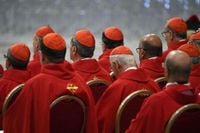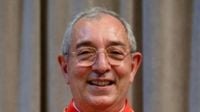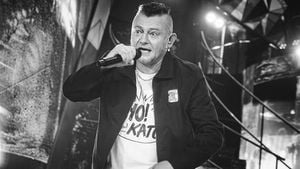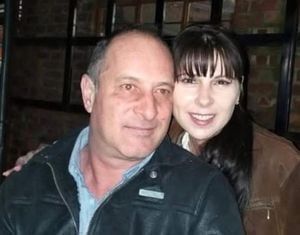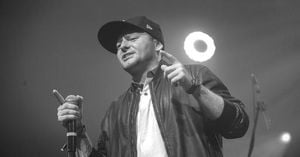As the Catholic Church prepares for a pivotal moment in its history, the upcoming Conclave set to begin on May 7, 2025, is stirring significant interest and speculation regarding the potential successor to Pope Francis. Among the names being floated is Cardinal Fernando Filoni, a prominent figure with a compelling background that positions him as a strong candidate for the papacy.
Born in Manduria, in the province of Taranto, Cardinal Filoni has deep roots in Italy. His family moved to Galatone, in Lecce, when he was just six years old. His journey through the Church has been marked by notable moments, including his time as the only Western ambassador to remain in Iraq during the tumultuous second Gulf War, which began on March 19, 2003. Filoni's commitment to the Iraqi people during this crisis earned him a pectoral cross from local Muslim communities, a symbol of solidarity and respect for his unwavering presence in a time of need.
As reported by Il Corriere della Sera, Filoni's profile as a potential successor to Jorge Mario Bergoglio has garnered attention due to his extensive experience within the Vatican and his ability to navigate complex international situations. The article highlights that he accompanied Pope Francis on his historic trip to the land of Abraham in 2021, further solidifying his reputation as a bridge-builder in a time of division.
However, the Conclave itself presents a myriad of challenges. Over 130 cardinals will gather in the Sistine Chapel, representing 66 countries, with Italy holding the largest contingent of just 19 cardinals. This diverse assembly reflects a shift in the Church's global representation, moving beyond traditional power dynamics and emphasizing a more inclusive approach. The complexities of this Conclave are underscored by the need for unity amidst potential ideological rifts.
Cardinal Gerhard Muller, a prominent voice within the Church, has warned against the dangers of ideological divisions that could fracture the unity of the Church. In an interview with Il Messaggero, he emphasized, "The risks are all related to the possibility of splitting the Church into two ideological groups." He advocates for a holistic approach that transcends political maneuvering, urging the cardinals to focus on the theological essence of the papacy.
In a similar vein, Cardinal Filoni has articulated the necessity for the new Pope to reinforce the Church's unity. He stated, "The new pontiff must continue to speak a word of truth, never partisan, and work to restore the common good and peace." This call for cohesion is particularly poignant as the Church seeks to navigate the turbulent waters of contemporary issues while remaining steadfast in its mission.
The Conclave is not merely a political exercise; it embodies a complex interplay of power, faith, and tradition. The cardinal-electors are not just representatives of their nations but also of the diverse theological currents within the Church. The challenge lies in finding a candidate who can unify these differing perspectives while maintaining fidelity to the core mission of the Church.
As the Church grapples with its identity in a rapidly changing world, the legacy of Pope Francis looms large. His approach to leadership, characterized by a focus on mercy and inclusivity, has resonated with many, but it has also sparked debates about the future direction of the Church. Some cardinals are invoking his name to advocate for continuity, while others are calling for a reevaluation of certain practices and doctrines.
In the midst of this backdrop, the controversy surrounding Cardinal Ouédraogo's birth date has also surfaced, raising questions about transparency and accountability within the Vatican. Allegations that his official birth date was modified to allow him to participate in the Conclave have sparked scrutiny. Previously, he would have turned 80 on January 25, 2025, thus disqualifying him from voting. This incident, alongside similar adjustments made for other cardinals, adds a layer of complexity to the proceedings.
As the Conclave approaches, the atmosphere is charged with anticipation. The solemn oath for those participating will take place on May 5, 2025, at 5:30 PM in the Pauline Chapel, marking the official commencement of the election process. The stakes are high, and the decisions made in the Sistine Chapel will shape the future of the Catholic Church for years to come.
The interplay of tradition and modernity is palpable as the cardinals prepare to cast their votes. Figures like Cardinal Matteo Maria Zuppi, Archbishop of Bologna, and Cardinal Mario Zenari, Apostolic Nuncio in Syria, represent a blend of pastoral care and diplomatic experience. Their roles in the Conclave will be crucial as they navigate the delicate balance between maintaining the Church's heritage and addressing contemporary challenges.
Ultimately, the next Pope will inherit a Church at a crossroads, one that must reconcile its rich history with the pressing demands of the present. The call for unity resonates louder than ever, as the Church seeks to avoid a schism that could fracture its global community. As Cardinal Filoni aptly noted, "The new pontiff must be a mediator capable of continuing the synthesis of the era of Francis."
With the world watching, the Conclave promises to be a defining moment for the Catholic Church, one that could either reinforce its unity or expose its divisions. As the smoke rises from the Vatican, the faithful and the curious alike will await the announcement of the new Pope, hopeful for a leader who can guide the Church through its challenges while remaining true to its mission of love, compassion, and service.
